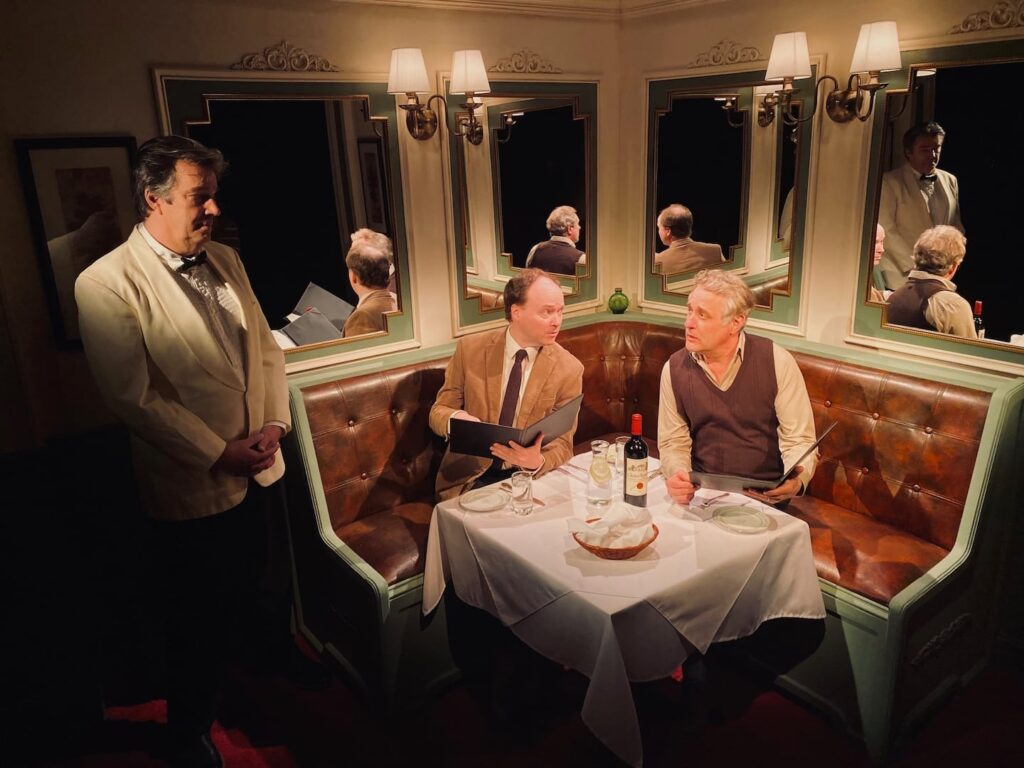
“My Dinner with Andre” Photo: Joe Kenehan
My Dinner With Andre’ – Based on the film by Wallace Shawn and André Gregory. Developed by Johnathan Fielding and Robert Kropf. Production Stage Management by D’Arcy Dersham. Scenic Design by Evan Farley. Lighting Design by John Malinowski. Produced by Harbor Stage Company, ‘My Dinner With Andre’ runs from March 13th – March 30th at 539 Tremont Street, Boston, MA 02116.
By Charlotte Snow
Many great conversations happen at a table, over the course of a meal, when thoughts are shared and hearts are bared. The ritual of devouring sustenance and drinking in words can be deeply human. Harbor Stage Company’s My Dinner With Andre endeavors to serve a slice of life, but the meat and potatoes are far too small a portion and leave the audience famished.
The play is adapted from the 1982 arthouse film of the same name, conceived by and starring Wallace Shawn and André Gregory. The film’s plot is simple but complex in execution and theme. Wally, a moderately successful but struggling playwright and actor, reconnects with his former friend and colleague, André, in Manhattan’s Café des Artistes. Though they once shared similar backgrounds as theatre artists, it soon becomes apparent to Wally that André’s life has taken several turns for the stranger.
It can’t go without saying that the production and design elements of this play are a feast for the senses. The orientation of the set within the black box is inspired and creates a true intimacy. Evan Farley’s set overflows with authenticity and detail. It’s probably the closest I’ll ever get to eating at a five-star restaurant. The appropriately moody lighting, crafted by John Malinowski, was simple yet incredibly effective. Though the program does not denote a props designer, it remains impressive that the accurate silverware, glassware, plateware, and food were sourced. All these branches of designs cooked up a true detail-filled treat.
The script however, often to its own detriment, leans into hyper-realism. There is such a commitment to “the realistic,” that the play isn’t bothered with theatricality or audience-enjoyability. On its own this is not a bad thing; it’s simply a challenge for the viewers that will work more for some more than others. If you aren’t keen on listening to that one long-winded friend who goes on and on with rambling stories, then this isn’t the play for you. The first thirty minutes or so of the piece are several long, unrelated, and descriptor monologues from André, mostly centering on a rigid view of art, suffering, consciousness, modernity, and humanity. While they are beautifully and simply acted by Robert Kropf, the constant stories quickly grow tedious. It becomes increasingly apparent that André is far removed from the reality which he claims to be so connected to, causing an inherent major disconnect from him and the audience. When it’s finally time for Wally to respond and speak his own mind, his responses are underwhelming at best. He never seems to leave much of a lasting mark on André. Even when Wally begins a dialogue, it’s primarily rooted in and driven by André’s remarks. I would have loved to have seen a play where André was just as changed by the dinner as Wally was.
All the concepts and ideas that were discussed and debated are left as nothing more than ideas and words once the bill is paid and the play just ends. There’s no major decision or action or increase in character growth that’s been made, only discussion. The script seems to want to say something, or have the audience choose what it says, but even then, the play is too non-committal to decide either way.
The major saving grace of this production is the actors. Jonathan Fielding’s Wally and Robert Kropf’s André have a silent electric chemistry that sparks off them. Both of their performances are incredibly subtle, nuanced, and dropped in while undergoing the herculean task of making each word of this script come alive. Not a moment goes by when either actor isn’t intently and actively listening to the other. Robin Bloodworth also makes brief but impactful appearances as the waiter, who serves so much presence when he’s onstage.
In my seven years of living in Boston, I’ve yet to see performances as grounded and committed to “the doing” of an activity as these were. My only wish is that these actors could be in a project with a script that could showcase their range. My Dinner With Andre is far better suited to the stage than the screen; however, given the current political climate, its very existence bears the age-old question of “why this play? Why now?”
For more information visit: https://www.harborstage.org/

